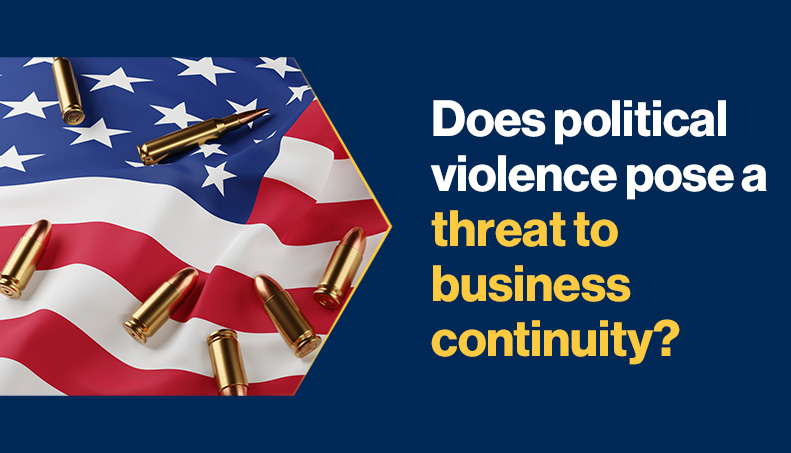Trump assassination attempt: Does political violence pose a threat to business continuity?

On 15th July, former President and Republican leader, Donald Trump, survived an assassination attempt at a political rally in Butler, Pennsylvania. During the incident, one rally attendee died, and two others were critically injured. The shooter, 20-year-old Thomas Crooks, was killed by the Secret Service. This assassination attempt is one instance in a series of political challenges during 2024 which has been dubbed ‘the year of the elections’ in which at least 64 countries head to the polls[1].
So far this year, South Africa’s ruling ANC party and India’s National Democratic Alliance have both lost their majority, and unease has grown across Europe, not least in the UK where the conservative government suffered its first defeat in 14 years and in France, where voters clashed with police following a shock left-wing coalition victory. In South America, Bolivia’s attempted coup exposed a deep and ongoing political divide. In light of the unparalleled amount of global political activity this year, practitioners should ensure political violence, and the threat of political violence is placed high on risk registers.
The effects of political violence, such as protests and riots, include damage to infrastructure (water, power, building safety), and disruptive influences on transport and supply chains. For example, take the case of Bolivia, a region with large reserves of lithium. Lithium enables power for electronic devices, such as grid-scale energy storage, electric vehicles, and military applications. Therefore, political conflict there may result in worldwide consequences via the global supply chain. Conflicts also deliver economic instability, particularly in urban areas where disruption prevents retailers from opening, factories from operating, and market shocks such as stock price falls and investment hesitancy. Furthermore, conflict can affect staff wellbeing as societal norms are overturned and, in the worst cases, day-to-day living becomes about survival[2].
The BCI Resilience in Conflict Report 2022 told how nearly all organizations are affected by conflict. 61.7% of survey respondents reported they were currently affected by the impacts of conflict and 74.8% were experiencing its secondary effects. As a result, nearly a third (31.0%) of respondents had shut down part of their operations as a preventative response measure, and 26.7% had temporarily closed their operations across an entire geography. This research highlights the sizable risks of conflict to business as usual.
To mitigate the effects, practitioners should consider conducting risk assessments that identify vulnerabilities to political violence and assess the potential impact on business operations, for example, in the case of Donald Trump’s attempted assassination, organizations based near future rally sites may implement working from home measures to protect their staff. On a global scale, organizations should ensure flexible plans are not only in place within their own countries, but in all regions experiencing elections.
With so many elections taking place, it’s likely that most organizations will feel the outcome of political upheaval this year, but with good oversight of the geopolitical situation at home and abroad, practitioners can adjust plans to tackle disruptions and respond quickly to emerging risks to ultimately deliver business as usual.
Citations
[2] Political violence, collective functioning and health: A review of the literature - PMC (nih.gov)










































